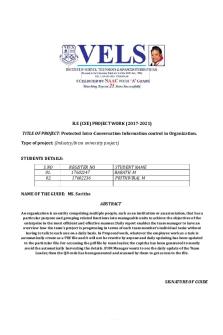Abstract X - Grade: A PDF

| Title | Abstract X - Grade: A |
|---|---|
| Author | Sofia Haskel |
| Course | The Spanish Civil War |
| Institution | Tulane University |
| Pages | 2 |
| File Size | 63.4 KB |
| File Type | |
| Total Downloads | 56 |
| Total Views | 162 |
Summary
weekly paper...
Description
Sofia Haskel 4 November 2019 Abstract X – The Victorious Counterrevolution American historian Michael Seidman outlines the Spanish Civil War from a new perspective, one that focuses on the nationalist victory and analyzes the many causes. He employs a wide timeline, starting from the downfall of the second republic and ending with the results of the war but also including a glimpse of Spain’s economic future under Franco. The use of comparison is evident in this book, and Seidman justifies its importance in his introduction before using it generously in The Victorious Counterrevolution. Unlike most other historians, Seidman credits Franco’s victory less with German and Italian aid and more with their economic advantage. He specifically gives the animals and food supply attention, mentioning the mules’ “least celebrated but most critical role” in the war (p.96). The way both sides financed the war also affected their military strength. While the republic ate up its gold reserves, the nationalists taxed their constituents for a steady flow of income. Franco also nourished his soldiers’ morale substantially, through means of letters from women, movies, tobacco, and more. The use of pro-Catholic propaganda and the church’s support reigned in loyalty from both inside and outside of Spain. Unfortunately, this included the use of anti-Jewish propaganda which propelled support from Hitler and Mussolini. In general, Seidman believes fascism’s victory is due to the system itself – Franco’s tight, controlling reign allowed for the unwavering pay of soldiers and workers, gave property rights to landowners, and allowed for the economy to sustain itself during the war. The author’s perspective is clearly enthusiastic for the rebels, evident through his praise of their strategies and organization. The book provides plenty of valuable details and history of
the war, but one must watch for his bias when determining one’s own opinion on the reasons for the nationalist victory.
Questions: 1. What were both sides lacking in terms of supplies, considering that the republic was in control of more urban areas and the nationalists had more agricultural areas? 2. Could the outcome of the war have been different if the republic had stopped fighting once a nationalist victory was clear? 3. Why does Seidman’s perspective differ from most other historians’ who cover the war, and does this weaken or strengthen his writing?...
Similar Free PDFs

Abstract X - Grade: A
- 2 Pages

(Space X) The Market - Grade: A
- 9 Pages

Abstract
- 11 Pages

Abstract
- 2 Pages

Abstract 1
- 1 Pages

Abstract - dfdxf
- 1 Pages

Abstract Krypton
- 1 Pages

A child - Grade: A
- 5 Pages

A Dog\'s Purpose - Grade: A
- 8 Pages

A Good Friend - Grade: A
- 4 Pages

A Beautiful Mind - Grade: A+
- 6 Pages

FARC abstract - Rafa Daza
- 2 Pages
Popular Institutions
- Tinajero National High School - Annex
- Politeknik Caltex Riau
- Yokohama City University
- SGT University
- University of Al-Qadisiyah
- Divine Word College of Vigan
- Techniek College Rotterdam
- Universidade de Santiago
- Universiti Teknologi MARA Cawangan Johor Kampus Pasir Gudang
- Poltekkes Kemenkes Yogyakarta
- Baguio City National High School
- Colegio san marcos
- preparatoria uno
- Centro de Bachillerato Tecnológico Industrial y de Servicios No. 107
- Dalian Maritime University
- Quang Trung Secondary School
- Colegio Tecnológico en Informática
- Corporación Regional de Educación Superior
- Grupo CEDVA
- Dar Al Uloom University
- Centro de Estudios Preuniversitarios de la Universidad Nacional de Ingeniería
- 上智大学
- Aakash International School, Nuna Majara
- San Felipe Neri Catholic School
- Kang Chiao International School - New Taipei City
- Misamis Occidental National High School
- Institución Educativa Escuela Normal Juan Ladrilleros
- Kolehiyo ng Pantukan
- Batanes State College
- Instituto Continental
- Sekolah Menengah Kejuruan Kesehatan Kaltara (Tarakan)
- Colegio de La Inmaculada Concepcion - Cebu



